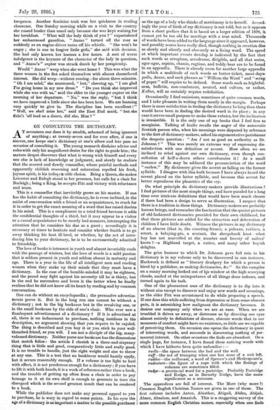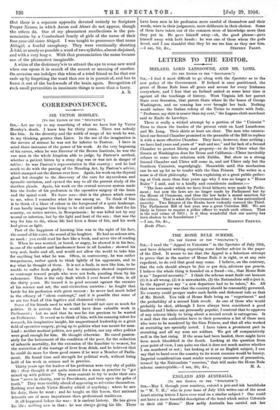ON CONSULTING THE DICTIONARY.
AT seventeen one does it by stealth, ashamed of being ignorant of anything ; at twenty-seven and for ever after, if one is sincere, one keeps one's dictionary at one's elbow and lets pass no occasion of consulting it. The young monarch disdains advice and rules with only his magnificent desire for the right to guide him ; the mature despot discovers that what is wrong with himself and every one else is lack of knowledge or judgment, and slowly he realizes that the scarred and dowdy counsellor, whose painful methods and apparently childish reasoning and reiteration repelled his fresh, joyous spirit, is his indisr cn table choice. Being a Queen, she makes Leicester and Ralegh stand in her presence, but calls for a chair for Burleigh ; being a King, he accepts Pitt and victory with reluctance and tears.
This is a counsellor that inevitably grows on his master. If one has the habit of consulting the dictionary, he is even inclined, in the midst of conversation with a friend or an acquaintance, to reach for it in order to get the exact meaning of a word that has rained doubts in his mind. This is a compliment to a tried friend because it adds the confidential thoughts of a third, but it may appear to a visitor or a casual acquaintance to be merely bad manners, interrupting the attention that he considers his due as a guest ; accordingly it is necessary at times to hesitate and consider whether Smith is to go away thinking his host ill-bred, or whether, by the act of intro- ducing him to your dictionary, he is to be sacramentally admitted to friendship.
The love of books is intensest in youth and almost invariably cools with the passage of winters, but the love of words is a mild passion that is seldom present in youth and seldom absent in maturity and age. There is a year in the life of all intelligent men and reading women when they make up their minds that they must have a dictionary. In the case of the humble-minded it may be eighteen, and the proud may fight against his necessity till he is thirty, but in the end he surrenders and loves it the better when he finally realizes that he did not know all its heart by reading and by common conversation.
One can do without an encyclopaedia ; the persuasive advertise- ments prove it. But in the long run one cannot be without a dictionary ; not in the big bookcase but in the revolving one, or in the small bookcase by the side of one's chair. Who ever saw a flamboyant advertisement of a dictionary 7 If it is advertised at all, there is no inducement to purchase, nothing insidious in the description, no argument showing that you require to be cajoled. The thing is described and you buy it or you stick to your well- thumbed. friend, as you will. I am not a disciple of the big, many- cohuned dictionary. Neither purse nor bookcase has the dimensions that match folios : the article I cherish is a three-and-sixpenny thing that is little and good, comparatively little and really good. It is no trouble to handle, just the right weight and size to throw at any one. This is a test that no booklover would hastily apply, but it occurs reasonably enough. If a volume is too light to hurl with effect, it is not ponderous enough for a dictionary ; if you have to lift it with both hands, it is a work of reference rather than a book, and the trouble of getting up often from a chair in order to pay homage to it at its own shelf is enough to generate in time the disregard which is the second greatest insult that can be rendered to a book.
While the publisher does not make any personal appeal to you to purchase, he is wary in regard to some points. In his eyes the age of a dictionary is as important a matter to the possible purchaser
as the age of a lady who thinks of matrimony is to herself. Accord. ingly the year of birth of my dictionary is not told, but as it appears from a short preface that it is based on a larger edition of 1898, it
cannot yet be too old for marriage with a true mind. Thousands of words have been added to the language since it appeared, however, and possibly scores have really died, though nothing in creation dies as slowly and silently and obscurely as a. living word. The speed at which important events develop is indicated by the fact that such words as aeroplane, aerodrome, dirigible, and all that series, agar-agar, aspirin, chassis, ragtime, and teddy-bear are to be found
in an appendix. There is already room for another large appendix in which a multitude of such words as butter-ticket, meat-days. pails, Anzac, and such phrases as " William the Weed " and " scrap of paper " will require to be defined. Some words such as frightful: nese, bulletin, non-combatant, neutral, and culture, or rather; Sulfur, will as certainly require redefinition.
Occasionally I find omissions, sometimes of quite common words, and I take pleasure in writing them neatly in the margin. Perhaps there is more satisfaction in finding the dictionary lacking than there would have been in finding the desired word in its place ; in any case it serves small purpose to make these rubrics, but the inclination is irresistible. It is the only one of my books that I feel free to marginize. Talking of faults recalls the anger of the autocratic Scottish parson who, when his meanings were disputed by reference to the first of dictionary-makers, asked his argumentative parishioner the despotic question : " Am I not as good an authority as Dr.
Johnson ? " This was merely an extreme way of expressing dis- satisfaction with one definition or accent. How often we are inclined to rebel against our own dictionary, even though con- sultation of half-a-dozen others corroborates it ! As a small instance of this may be adduced the pronunciation of the word " curlew." My dictionary gives the accent as falling on the former syllable. I disagree with this both because I have always heard the accent placed on the latter syllable, and because this accent far better reproduces the phonetics of the cry.
On what principle do dictionary-makers provide illustrations ? I find pictures of the most simple things, and have puzzled for a long time over intricate definitions that would have been much clearer if there had been a design to serve as illustration. I suspect that there is a tradition in these things. Dictionary-makers are probably human beings, and remember the fascination that the quaint pictures of old-fashioned dictionaries provided for their own childhood, for that these pictures are added for the attraction and delectation of children I have little doubt. Witness the pictures in my dictionary of an abacus (that is, the counting-frame), a poleaxe, ratlines, a retort, a belaying-pin, a sextant, the sheepshank knot—what boy has not marvelled at the number and beauty of eailors' knots 7—a Highland target, a cutter, and many other boyish delights.
The grim humour to which Dr. Johnson gave full rein in his dictionary is in my volume only to be discovered in one instance.
Hackwork is defined as " literary drudgery for which a person is hired by a publisher, as making dictionaries, &c." So the compiler on a sunny morning looked out of his window at the high scurrying clouds, smiled at the unimportance of all things done indoors, and turned again to his task.
One of the pleasantest uses of the dictionary is to dip into it without aim except to discover and enjoy new words and meanings, as the elder Pitt was accustomed to do while preparing a speech.
If one does this while suffering from depression or from some obscure pain, it is astonishing how malignant the dictionary becomes. It desires our company only when we are at ease. When we are troubled it drives us away, or distresses us by directing our eyes almost entirely to definitions of disease, obscure words that in our moments of comfort might have no existence, so little are we capable of perceiving them. On occasion one opens the dictionary in quest
of interesting words, and succeeds in discovering nothing of per- manent interest. On other occasions the finds are abundant. On single Inge, for instance, I have found these enticing words with which I have hitherto been quite unfamiliar :—
ruelle—the apace between the bed and the wall.
ruff—the act of trumping when one has none of a suit left. ruddoc—the redbreast, a word of Spenser's and Shakespeare's. radenfure—the figure of a rope with which the flutings of columns are sometimes filled.
ridge—a provincial word for a partridge. Probably Partridge and Budge, as in Barnaby Budge, have the same significance as a surname.
The appendices are full of interest. The More (why more ?) Common English Christian Names are given in one of these. The first column includes Aaron, Abiathar, Abigail, Abihu, Abijah, Abner, Absalom, and Amaziah. This is a staggering survey of the
more common English Christian names, especially when one finds
that there is a separate appendix devoted entirely to Scripture Proper Names, in which Aaron and Abner do not appear, though the others do. One of my pleasantest recollections is the pro- nunciation by a Cumberland family of girls of the name of their four-year-old sister Abigail. I was taught to pronounce that name Abbigal, a fearful cacophony. They were continually shouting A-bikl, as nearly as possible a word of two syllables, almost disjoined, and with a very long a. With that pronunciation the name became one of the pleasantest imaginable.
A whim of the dictionary's is to attract the eye to some new word when one opens it in search of the accent or meaning of another. On occasion one indulges this whim of a tried friend so far that one ends up by forgetting the word that one is in pursuit of, and has to ferret it out of the backwoods of the brain again. Recognition cf such small perversities in inanimate things is more than a fancy.
A. S.































 Previous page
Previous page